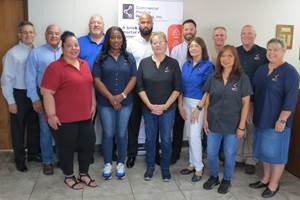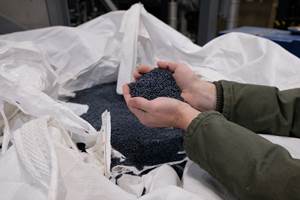Former Has a Full-Blown Focus on Sustainability
Shepherd Thermoforming’s operation has spared millions of PET bottles from death by landfill. It also has taken steps to slash its own energy and water consumption.
A thermoformer’s commitment to make products from sheet containing post-consumer plastic is diverting millions of PET bottles from landfills. Last year alone, Shepherd Thermoforming and Packaging Inc., Brampton, Ont., processed about 4 million lb of recycled PET (RPET), roughly 75% of its overall throughput, which translates into about 43 million water bottles. What’s more, the thermoformer regrinds PET skeleton scrap and sends the material back to its sheet suppliers for reuse.
Shepherd also forms sheet from a variety of other materials, including HIPS, PP, HMW-HDPE, PVC, PLA, and ABS. Scrap generated from these production runs is also reground and sold to manufacturers of composite wood decking, vinyl siding, and carpeting, states Mark Shepherd, the company’s vice president who, along with Todd Shepherd, his brother and company president, runs the family-owned business.
Shepherd Thermoforming was started in 1985, and Mark and Todd took over the business when their parents retired in 2007. Today, the custom processor is ISO 9001: 2008 and SQF certified and employs about 40 in a 45,000 ft2 production plant that houses four roll-fed and two rotary formers, giving it the flexibility to run both thin- and heavy-gauge products. Roll-fed, thin-gauge products range from 0.005 in. to 0.080 in. thick at a maximum forming area of 30 × 36 in. × 7-in. draw. Thicker sheet-fed products run from 0.020 to 0.5 in. with a maximum forming area of 60 × 120 in. × 36-in. draw.
Shepherd is a full-service former, offering process/product design and development, prototyping/sampling, and in-house tool building. Shepherd also offers a variety of post-forming assembly, trimming, and decorating operations. The latter include distortion or so-called contour printing. In this process, a distorted version of an image is printed on the sheet before it’s formed in such a way that the printed image appears undistorted in the 3D finished part.
Most of its RPET products are formed into consumer packaging, direct-food-contact packaging, or material-handling trays, though the processor also offers other specialty rigid plastic products. Shepherd has been working with reclaimed material since the early 1990s. The firm has demonstrated its commitment to sustainability beyond its efforts in recycling. In 2009, Shepherd launched a three-part energy-saving retrofit project, focusing on both electrical and water consumption.
In phase one, the company replaced some of its metal halide 400W and fluorescent T12 style units used in the production areas with T8 and T5 energy-efficient fluorescent lighting. In the first year alone, this effort cut Shepherd’s energy consumption by 13,765 kWh.
In phase two, Shepherd focused on water consumption. Its process uses cooling water to control the temperature of both forming tools and the drive-chain mechanisms on the machines. Each of these processes requires that the cooling water be maintained at different temperature ranges. Previously, these two circuits shared the same cooling system, which resulted in a higher quantity of fresh water being consumed, along with more wastewater being released into the city sewer system. Shepherd conducted an internal water audit, and concluded that operating separate chiller units on closed-loop systems for each process would offer the greatest reduction in water usage. After implementing the change, Shepherd has managed to reduce its water consumption and wastewater volume by more than 35% vs. the previous setup.
In phase three, the company retrofitted the office lighting with more energy-efficient units that are calculated to save another 3420 kWh annually.
The total project cost Shepherd just $3000 to implement.
Related Content
Inside the Florida Recycler Taking on NPE’s 100% Scrap Reuse Goal
Hundreds of tons of demonstration products will be created this week. Commercial Plastics Recycling is striving to recycle ALL of it.
Read MoreNew Facility Refreshes Post-Consumer PP by Washing Out Additives, Contaminants
PureCycle prepares to scale up its novel solvent recycling approach as new facility nears completion.
Read MoreNova Chemicals Attains FDA Letter for Mechanically Recycled LLDPE
RLLDPE product will be marketed for applications including food packaging.
Read MoreStar Plastics Achieves ISCC Plus Certification
West Virginia-based custom compounder adds to its sustainability credentials.
Read MoreRead Next
Lead the Conversation, Change the Conversation
Coverage of single-use plastics can be both misleading and demoralizing. Here are 10 tips for changing the perception of the plastics industry at your company and in your community.
Read MoreMaking the Circular Economy a Reality
Driven by brand owner demands and new worldwide legislation, the entire supply chain is working toward the shift to circularity, with some evidence the circular economy has already begun.
Read MoreBeyond Prototypes: 8 Ways the Plastics Industry Is Using 3D Printing
Plastics processors are finding applications for 3D printing around the plant and across the supply chain. Here are 8 examples to look for at NPE2024.
Read More



















